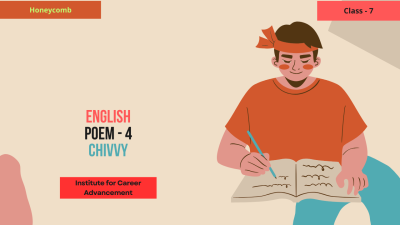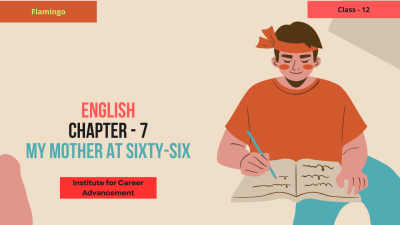Course description
Chapter Title: Chivvy
Author: Agnes Groves
Introduction to the Chapter
"Chivvy" is a lighthearted and thought-provoking poem by Agnes Groves that deals with the repetitive behavior of adults towards children. The poem humorously describes how adults often nag, command, and instruct children with phrases like "Don't do this!" or "Do that!" instead of allowing them to explore or think for themselves. Through the use of playful language, the poet conveys a message about independence and the importance of letting children make their own decisions while also subtly exploring the frustration that children feel when constantly "chivvied" by adults.
Plot Summary
The poem presents a child's perspective of being nagged or chivvied by adults. The speaker describes a variety of situations where they are told what to do, such as being ordered to sit up straight, eat properly, or stop talking. Through these commands, the poem highlights the tension between the child's desire for independence and the adult's need for control. The speaker reflects on how this constant chivvying feels tiresome, but it also suggests that adults may not always understand how they are affecting children with their persistent nagging.
Key Themes
Nagging and Control: The poem focuses on how adults, in their desire to help or guide children, sometimes overstep by nagging or issuing commands constantly.
Childhood Independence: The poem speaks to the child’s desire for autonomy and the frustration they experience when their actions are controlled too much.
Generational Differences: It subtly hints at the differences in how adults and children perceive authority, control, and freedom.
Frustration and Rebellion: The constant nagging may lead to feelings of rebellion or frustration in children, who yearn to make their own decisions.
Conclusion
By the end of the lesson on "Chivvy", students will:
Understand the theme of the poem and recognize the frustrations and desires of both children and adults.
Be able to identify poetic devices and analyze their impact on the mood and meaning of the poem.
Reflect on the importance of independence in childhood and discuss how communication can improve understanding between generations.
Express themselves creatively by writing about their own experiences with guidance and freedom, using humor and vivid language.
This chapter encourages students to explore the dynamics of childhood and adulthood while enhancing their literary skills, emotional intelligence, and creative expression.
অধ্যায়ের শিরোনামঃ চিভভি
লেখকঃ অ্যাগনেস গ্রোভস
অধ্যায়ের ভূমিকা
"চিভভি" অ্যাগনেস গ্রোভসের একটি হালকা মনের এবং চিন্তা-উদ্দীপক কবিতা যা শিশুদের প্রতি প্রাপ্তবয়স্কদের পুনরাবৃত্তিমূলক আচরণ নিয়ে আলোচনা করে। কবিতাটি হাস্যকরভাবে বর্ণনা করে যে কীভাবে প্রাপ্তবয়স্করা প্রায়শই বাচ্চাদের "এটি করবেন না!"-এর মতো বাক্যাংশ দিয়ে বিরক্ত করে, নির্দেশ দেয় এবং নির্দেশ দেয়। অথবা "এটা কর!" তাদের নিজের জন্য অন্বেষণ বা চিন্তা করার অনুমতি দেওয়ার পরিবর্তে। কৌতুকপূর্ণ ভাষা ব্যবহারের মাধ্যমে, কবি স্বাধীনতা এবং শিশুদের তাদের নিজস্ব সিদ্ধান্ত নিতে দেওয়ার গুরুত্ব সম্পর্কে একটি বার্তা প্রদান করেন এবং প্রাপ্তবয়স্কদের দ্বারা ক্রমাগত "উত্সাহিত" হলে শিশুরা যে হতাশা অনুভব করে তা সূক্ষ্মভাবে অন্বেষণ করেন।
প্লট সারসংক্ষেপ
কবিতাটি একটি শিশুর দৃষ্টিভঙ্গি উপস্থাপন করে যে সে প্রাপ্তবয়স্কদের দ্বারা বিরক্ত বা বিরক্ত হয়। বক্তা বিভিন্ন পরিস্থিতি বর্ণনা করেন যেখানে তাদের কী করতে হবে বলা হয়, যেমন সোজা হয়ে বসার, সঠিকভাবে খাওয়ার বা কথা বলা বন্ধ করার নির্দেশ দেওয়া হয়। এই আদেশগুলির মাধ্যমে, কবিতাটি শিশুর স্বাধীনতার আকাঙ্ক্ষা এবং প্রাপ্তবয়স্কদের নিয়ন্ত্রণের প্রয়োজনের মধ্যে উত্তেজনাকে তুলে ধরে। বক্তা প্রতিফলিত করেন যে কীভাবে এই অবিরাম চিভভিং ক্লান্তিকর বোধ করে, তবে এটি আরও পরামর্শ দেয় যে প্রাপ্তবয়স্করা সবসময় বুঝতে পারে না যে তারা কীভাবে তাদের অবিরাম বিরক্তিতে শিশুদের প্রভাবিত করছে।
মূল থিম
ন্যাগিং অ্যান্ড কন্ট্রোলঃ কবিতাটি কীভাবে প্রাপ্তবয়স্করা, শিশুদের সাহায্য বা গাইড করার আকাঙ্ক্ষায়, কখনও কখনও ক্রমাগত বাধা দিয়ে বা আদেশ জারি করে ওভারস্টেপ করে তার উপর দৃষ্টি নিবদ্ধ করে।
শৈশবের স্বাধীনতাঃ কবিতাটি সন্তানের স্বায়ত্তশাসনের আকাঙ্ক্ষা এবং তাদের ক্রিয়াকলাপগুলি অত্যধিক নিয়ন্ত্রিত হলে তারা যে হতাশার সম্মুখীন হয় তার কথা বলে।
প্রজন্মগত পার্থক্যঃ প্রাপ্তবয়স্ক এবং শিশুরা কীভাবে কর্তৃত্ব, নিয়ন্ত্রণ এবং স্বাধীনতা উপলব্ধি করে তার পার্থক্যের দিকে এটি সূক্ষ্মভাবে ইঙ্গিত করে।
হতাশা এবং বিদ্রোহঃ ক্রমাগত চাপ দেওয়া শিশুদের মধ্যে বিদ্রোহ বা হতাশার অনুভূতি সৃষ্টি করতে পারে, যারা তাদের নিজস্ব সিদ্ধান্ত নিতে আকুল আকাঙ্ক্ষী।
উপসংহার
"চিভভি" পাঠের শেষে শিক্ষার্থীরা বলবেঃ
কবিতার বিষয়বস্তু বুঝুন এবং শিশু ও প্রাপ্তবয়স্ক উভয়ের হতাশা ও আকাঙ্ক্ষাকে স্বীকার করুন।
কবিতার যন্ত্রগুলি সনাক্ত করতে এবং কবিতার মেজাজ ও অর্থের উপর তাদের প্রভাব বিশ্লেষণ করতে সক্ষম হন।
শৈশবে স্বাধীনতার গুরুত্ব প্রতিফলিত করুন এবং আলোচনা করুন যে কীভাবে যোগাযোগ প্রজন্মের পর প্রজন্মের মধ্যে বোঝাপড়া উন্নত করতে পারে।
হাস্যরস এবং প্রাণবন্ত ভাষা ব্যবহার করে নির্দেশনা এবং স্বাধীনতার সাথে তাদের নিজস্ব অভিজ্ঞতা সম্পর্কে লেখার মাধ্যমে সৃজনশীলভাবে নিজেদের প্রকাশ করুন।
এই অধ্যায়টি শিক্ষার্থীদের তাদের সাহিত্যিক দক্ষতা, আবেগগত বুদ্ধি এবং সৃজনশীল অভিব্যক্তি বাড়ানোর পাশাপাশি শৈশব এবং প্রাপ্তবয়স্কদের গতিশীলতা অন্বেষণ করতে উৎসাহিত করে।













